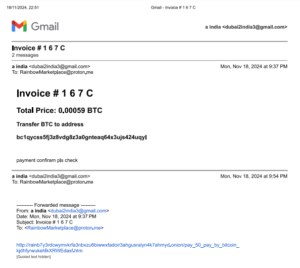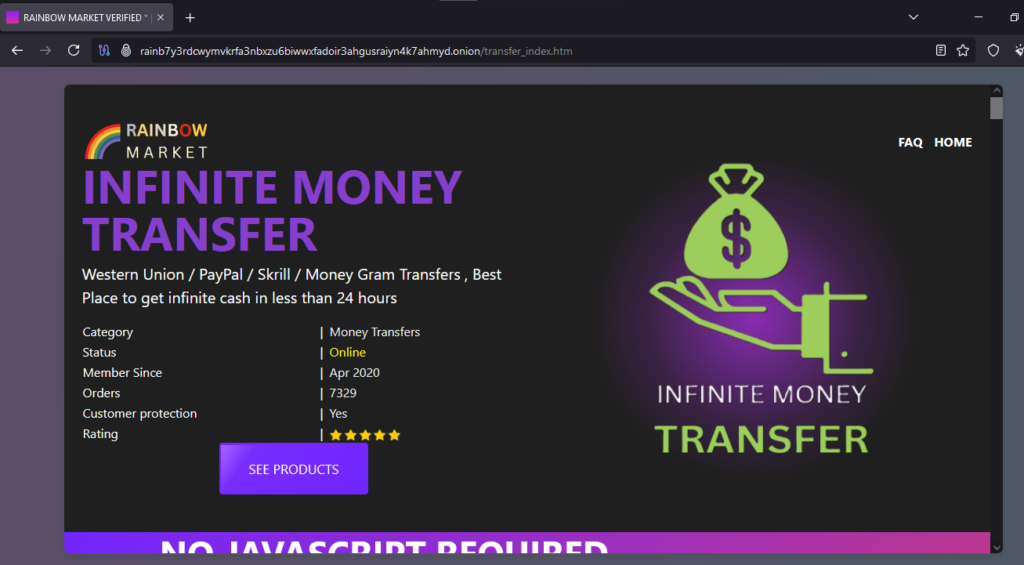Table of Contents
ToggleRainbow Market – TOR Scam Report (7)
Onion Link : http://rainb7y3rdcwymvkrfa3nbxzu6biwwxfadoir3ahgusraiyn4k7ahmyd.onion/transfer_index.htm
Scam Report Date : 2024-11-18
Client Scam Report Breakdown
Original Scam Report :
The client’s original report involves a transaction conducted on Rainbow Marketplace, an online platform accessed via the Tor network. It revolves around a service advertising “Infinite Money Transfer” capabilities through well-known platforms like Western Union, PayPal, Skrill, and MoneyGram. The service promises customers “infinite cash” within 24 hours, an overtly fraudulent claim. The platform portrays legitimacy with an extensive record of 7,329 orders and indicates customer protection features, suggesting guarantees or refunds. Despite its bold promises, this setup aligns closely with typical scam structures designed to exploit users by advertising impossible financial gains. The service’s alleged longevity (active since April 2020) and emphasis on established brands contribute to a false sense of security for potential victims.
Photos :

2. Defining Terminology and Scam Indicators
The report mentions several key elements that highlight potential fraud tactics. Rainbow Marketplace is described as an online platform accessible through Tor, a network used for anonymous communication and transactions. Marketplaces on the dark web are often rife with scams due to the anonymity they provide to users. The mention of an invoice suggests a formal request for payment, a common tactic scammers use to make transactions appear legitimate. The client transferred 0.00059 BTC, a specific cryptocurrency amount equivalent to a small monetary value at current exchange rates. This aligns with common practices in dark web transactions, where users are encouraged to make small payments first to build trust before larger transactions.
The URL provided is notable for its complexity and inclusion of multiple identifiers, indicating it is likely a phishing link or a fraudulent payment gateway. URLs on the Tor network, known as .onion addresses, are intentionally obfuscated, and scammers often create similar-looking links to mimic legitimate ones. Additionally, the Bitcoin address provided, bc1qycss5fj3z8vdg8z3a0gnteaq64x3ujs424uqyl, is a Bech32 address, a format commonly used for BTC transactions. Blockchain’s public nature allows transactions to be verified, but its pseudonymous design can shield the identity of malicious actors.
The phrase payment confirm pls check indicates the client expected a swift confirmation from the marketplace after transferring funds. The lack of response, paired with the forwarding of the initial email, underscores the client’s growing frustration and suspicion. Delayed or nonexistent responses are hallmark behaviors of fraudulent platforms designed to collect funds without delivering goods or services.
3. Analysis and Recommended Actions
The reported incident highlights several key vulnerabilities and red flags when dealing with online marketplaces, particularly those accessed via Tor. Firstly, the lack of response from Rainbow Marketplace raises concerns about the platform’s legitimacy. Scam marketplaces often entice users with professional-looking invoices and detailed instructions to build trust before stealing funds. The use of a complex .onion URL further suggests a phishing attempt designed to deceive users into transferring Bitcoin to unauthorized wallets.
To mitigate risks in future transactions, clients engaging in cryptocurrency exchanges must adopt stringent security measures. These include verifying platform authenticity through user reviews and community forums, using escrow services where possible, and avoiding direct transfers to addresses provided via unverified communication. The client’s documentation of the incident, including transaction details, email correspondence, and the URL, is essential for pursuing further investigation. Organizations specializing in blockchain analytics, such as CipherTrace or Chainalysis, can help trace the movement of funds. Additionally, reporting scams to platforms like BitcoinAbuse.com can help warn others and flag fraudulent Bitcoin addresses.
For potential victims, the case underscores the importance of recognizing scam tactics, such as unrealistic claims, phishing URLs, and unresponsive communication. Education about safe cryptocurrency practices, including enabling two-factor authentication and avoiding unknown payment gateways, can prevent similar incidents. As cryptocurrencies become more prevalent, platforms and users must remain vigilant against fraudulent schemes to build a safer digital ecosystem.






